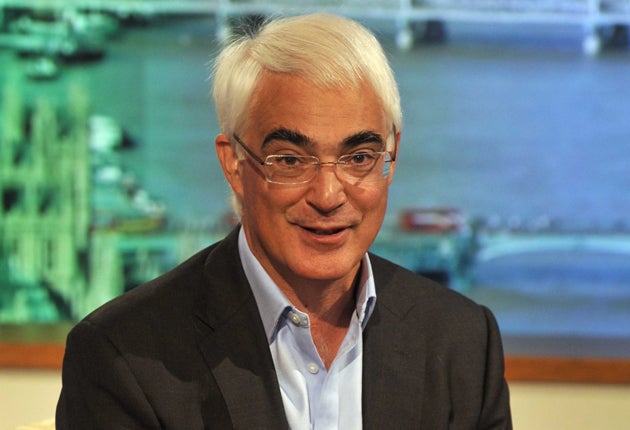Andrew Grice: Darling's book has caused pain today, but it could help Labour in the long run
Inside Westminster


During its last year in power, Labour was haunted by what its leading figures called "the C-word" – cuts. This week another C-word entered the Labour lexicon – credibility.
In office, Gordon Brown resisted pleas by his Chancellor Alistair Darling to spell out how Labour would reduce Britain's deficit. This week, Mr Darling returned to the spotlight to launch his book, Back from the Brink.
Referring to Mr Brown's refusal to say where Labour's cuts would fall, he told the BBC's Andrew Marr last Sunday: "If you don't have a credible economic policy, you are simply not at the races. And our problem was it was so blindingly obvious to the outside world that the two of us, Gordon and myself, were at odds that it really hampered us when it came to the election in 2010."
Mr Darling did NOT say that Labour's policy wasn't credible. He was highly unlikely to do so, since he was the architect of its plan to halve the deficit over four years. Inevitably, his words have been twisted by the Conservatives, who claim the former Chancellor admits Labour's economic policy was not credible then and is not now.
Although Mr Darling didn't say that, the damage has been done. The new C-word will stick, partly because it is credible. The public believe it. Labour trails the Government on economic credibility in the opinion polls. Labour MPs got the message in their constituencies this summer. "People who voted Tory last year are starting to worry about the economy and the cuts, but they are not coming over to us," one said. "They are still telling us it is our fault."
The Conservatives can hardly believe their luck. On Wednesday, David Cameron arrived at Prime Minister's Questions armed with a copy of the Darling book. He didn't have to use his nuclear deterrent. Despite the gathering economic storms at home and abroad, Ed Miliband kept off the economy, talking about police cuts instead. The Tories, keen to remind the public about Mr Brown at every opportunity, plan to portray Mr Miliband and shadow chancellor Ed Balls, both ex- Brown aides, as "Mr Boom and Mr Bust" at the next election.
Mr Darling has ruffled Labour feathers, but in the long run may have done his party a favour. Some Shadow Cabinet members seem to think they can sit back, wait for the Coalition's economic policy to fail and cruise to victory in 2015. Wiser heads describe that as sleepwalking to another defeat. Mr Darling's intervention may be a wake-up call. It has made the next few weeks an even bigger challenge for Mr Miliband. He will make two major speeches – on Tuesday, to the TUC's annual conference in London and, two weeks later, to Labour's conference in Liverpool. Smoke signals suggest his TUC speech will focus on the banks but he needs to begin the battle to regain economic credibility
The Labour leader has been good at identifying the challenges –the "squeezed middle"; the next generation being worse off than the current one and he spoke about "responsibility" before the riots brought that back into fashion. But he hasn't put much flesh on his three themes and needs an A to B route map ending in 2015. He may well have one in his head, but it's surely time to start telling voters about it.
Senior Labour figures say their "mea culpa" phase is over, that they want to talk about the future, not the past. But have the voters noticed a "mea culpa" on the economy? I doubt it.
During his Labour leadership campaign, Mr Miliband told me the party should no longer be spooked by the "old ghosts" of its pre-1997 period, such as its aversion to raising taxes and upsetting the City of London.
His problem is that Mr Darling is a new ghost, not an old one. Labour's mistakes and bitter personal feuds are still fresh in voters' minds.
Another of Mr Miliband's "old ghosts" is Labour's link with the trade unions. He believes in it and does not want to pick a Blair-style fight with the unions. But with more strikes possible over public-sector pensions, some advisers are urging him to dilute the unions' 50 per cent share of the vote at the Labour conference to signal he is not in hock to those who ensured his victory over his brother David a year ago.
Although various options are still on the table, Mr Miliband has not yet persuaded union leaders to give up some of their voting power. He does not want Labour's conference to be dominated by a row over the party's arcane voting procedures. So the question of the unions' power might be put off to another day.
Compass, the left-of-centre pressure group, warned yesterday that Labour's internal review must result in more than "cosmetic" changes and some shadow ministers fear that ducking the union issue would make Mr Miliband look weak.
So the Labour leader is facing two big hurdles on the economy and the unions. As one Labour MP put it: "He's got Balls Now he needs to show he's got balls."

Join our commenting forum
Join thought-provoking conversations, follow other Independent readers and see their replies
Comments